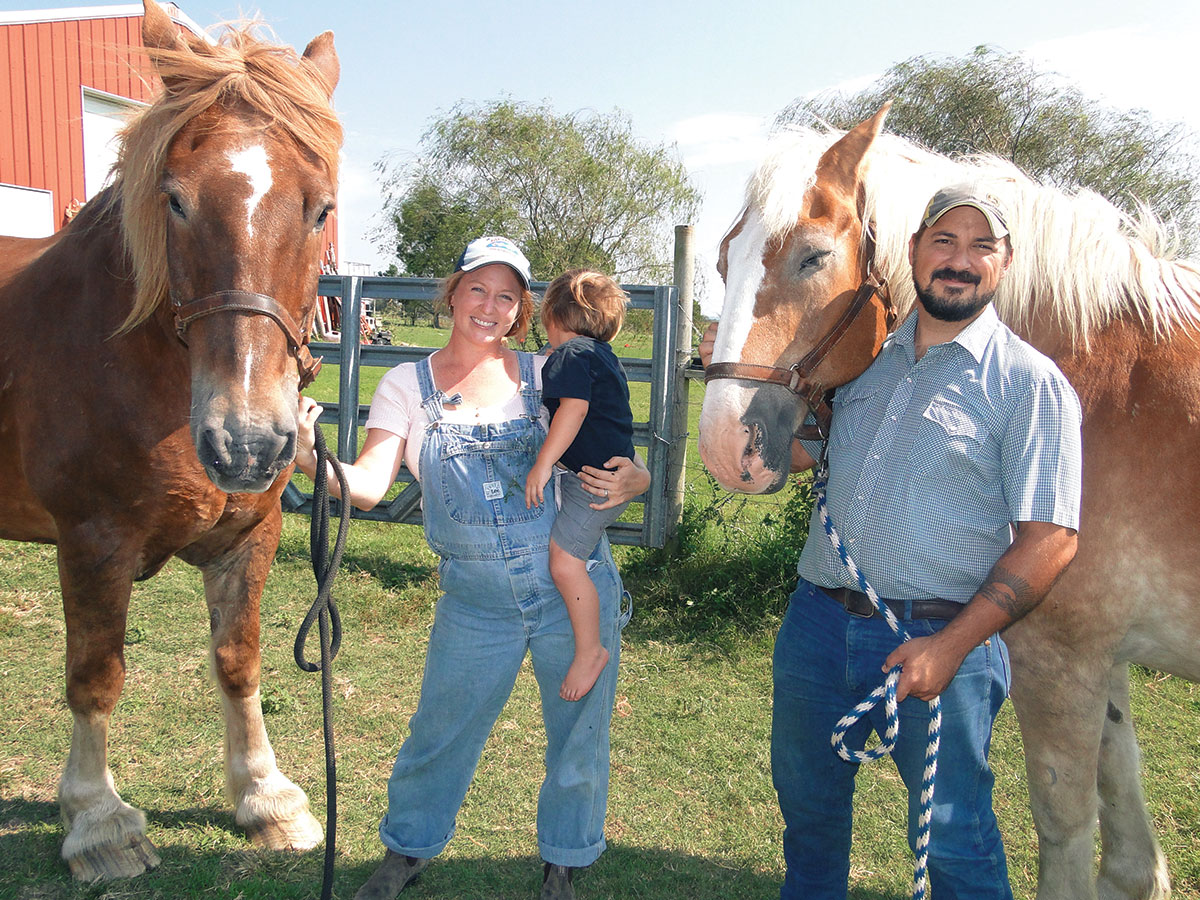
Jared and Lindi Phillips work their farm with a team of horses, and strive for small species diversity
Many people talk about feeding the world and the most generally held view is that production agriculture needs to increase feed efficiency through genetics as well as good pasture, nutrition and management. Jared and Lindi Phillips of Prairie Grove, Ark., believe two more contributions to the process will help feed the world’s exploding population.
They foresee a future in which small ruminants, and minimal but essential involvement in animal and land management, will feed more people and leave a smaller carbon footprint, perhaps even a negative one. Buying locally raised foods and avoiding long-distance transportation for any part of the farm-to-table process is a huge help. In simpler terms, bigger is not necessarily better.
“We believe in the power of community to balance ‘Big Progress’ with people of all kinds, including urban and rural, and live our lives in both communities,” explained Jared.
The Phillips are a young couple with two boys, 8-year-old Cass and 2-year-old Ben, with a daughter on the way. Jared is professor in the University of Arkansas’ International Studies program and focuses on peace, food security and human rights, in addition to rural development.
Lindi works the farm while raising their children. They own 90 acres, some of which is leased to others for haying. They are in the process of building a new home on nearby land and will sell their current property.
One of the reasons for the move is the Phillips want to work with a blank slate, having a size and shape more adaptable to a rotational grazing system that fits their desire for small species diversity. The Phillips are working with the Illinois River Watershed Partnership to share the cost of land development.
Currently, the couple raises Gulf Coast Native sheep and American Guinea Hogs. In addition, they utilize a team of Belgian horses, Oscar and Feliz, though they also use a tractor for baling hay. Generally, the horses are used for plowing and cultivating the garde, as well as cutting, fluffing and raking hay. Horses also brush hog by hauling a wagon sled. The 19-year-old team is also used to clip pastures. The horses have lived and worked together their whole lives and often wait at 8 a.m. with their heads hanging over a gate to see if they get to work that day, often walking off to sulk if not hitched up.
“A tractor doesn’t have a life or a soul,” said Lindi. “A tractor doesn’t care and accidents do happen. Oscar is like a guardian, and I feel safe.”
Golf Coast Native sheep are an exceedingly rare breed descended from the sheep brought by the Spaniards 500 years ago. They are a humidity-tolerant, parasite-resistant wool and meat species about half the size of Suffolks.
“Facebook and social media are absolutely essential for farmers like us,” Jared said. “They link us to other heritage breeders, a vast array of information, and contact with potential customers outside of our friends and family.”
In accordance with the Phillips’ philosophy, Lindi seeks to obtain as many products as possible from their herd of 15 ewes and one ram. Lindi sells some of her raw fleece to a Prairie Grove spinning group. As the women shop, they sort through the wool from each sheep searching for different fibers, textures and lengths to meet the needs of a specific product.
Lindi is also experimenting with tanning and bringing a finished fiber to market because the raw market is too small to handle their production. The Phillips also sell lamb to restaurants, such as Bentonville’s The Preacher’s Son.
The biggest challenge with the sheep is keeping gene diversity since the breed is so rare. To do so, the Phillips have to spread a wider net to obtain that diversity. Another challenge is herd health with minimal interference. Before breeding, all sheep receive an intensive physical exam and are vaccinated only with what is needed, and wormed individually only when the exam reveals the beginning of an issue.
The Phillips credit Prairie Grove’s Ken and Linda Coffey as their mentors in the sheep industry and the source of their initial breeding stock, while neighbors Randy and Cheryl West have been valuable sources of pasture health, hay production and much more.
American Guinea Hogs are another heritage breed the Phillips raise. Being slower growing than high-production hogs, they take longer than commercial breeds to finish out, ususally about 12 months. However, an advantage is they can finish on pasture. During the winter, the hogs receive hay and a fermented bucket of a specially designed ration every other day.
Jared and Lindi have both lamb and pork processed at a USDA-inspected facility so they can sell individual cuts though quarters, halves and whole carcasses are still available.
A final part of their operation is raising hay. They produce square bales for small ruminants according to organic standards. They fertilize according to soil samples and use as little as possible. They have 15 acres of land set aside for hay and usually produce 1,500 to 2,000 bales a year, some of which they sell as part of the farm’s income.
The Phillips love their lives and look forward to their new home and land. Perhaps the best part is raising their children in a lifestyle they love.






